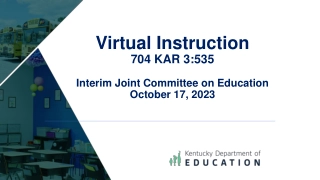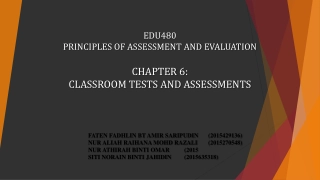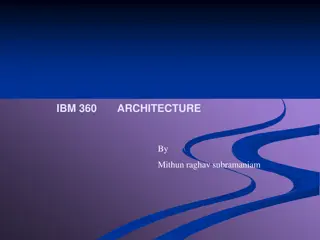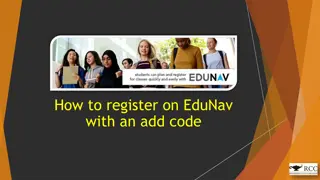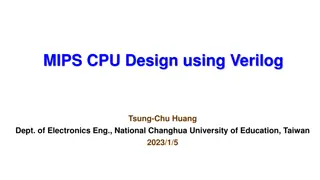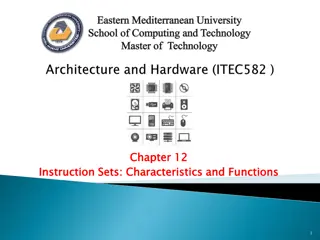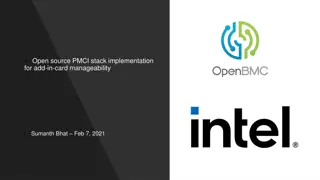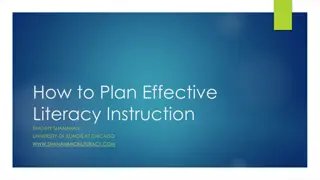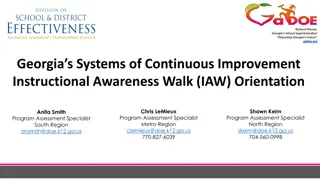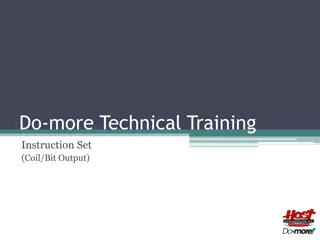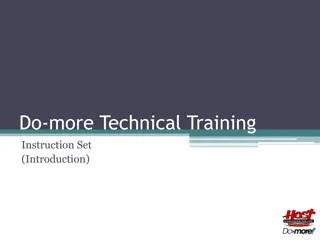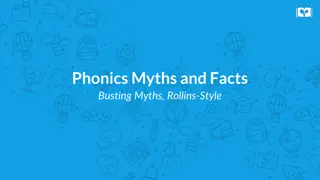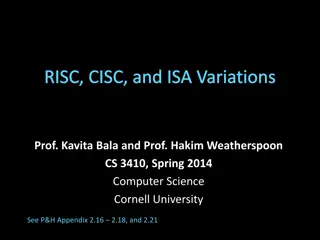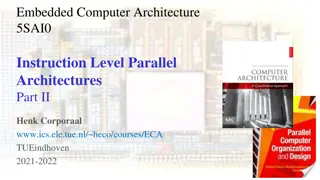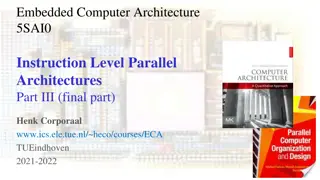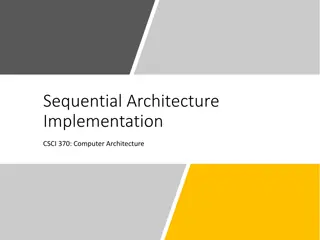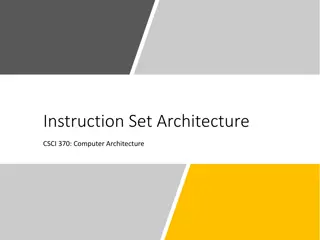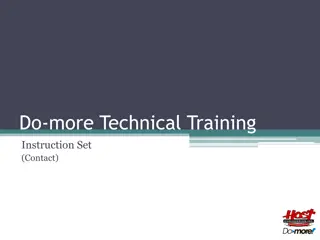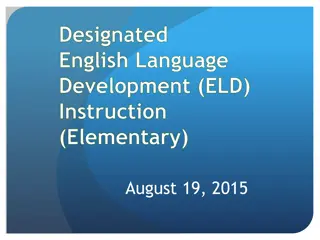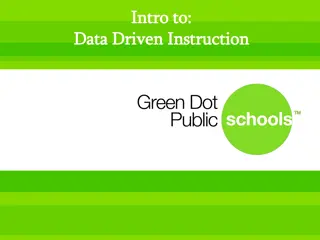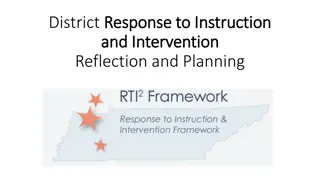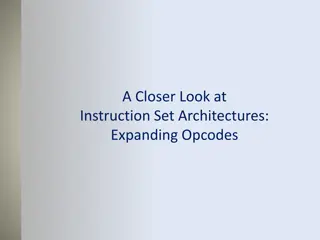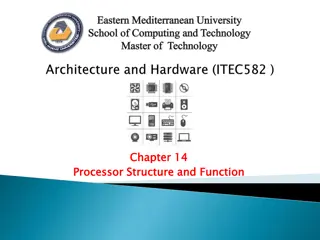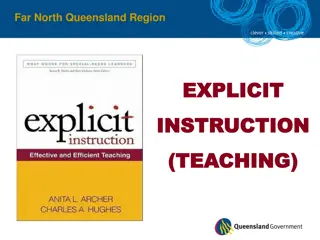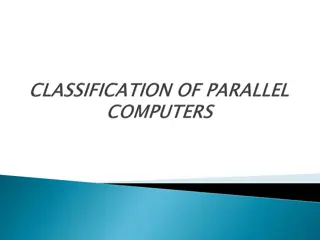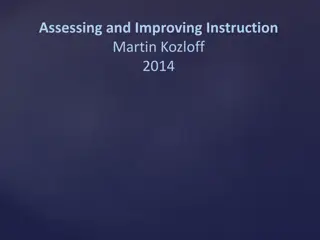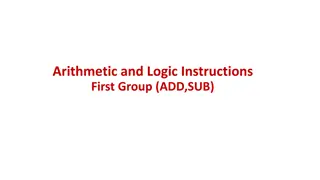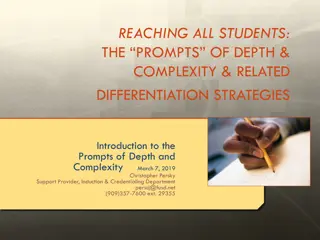Virtual Instruction
The evolution of Kentucky's virtual instruction program, from its early beginnings to the current program structures and enrollment options. Discover how districts have adapted to support online and virtual learning, and the potential for multi-district programs in the future.
0 views • 14 slides
Key Facts About Supplemental Instruction
Supplemental Instruction (SI) is student-led instruction for historically difficult courses, fostering collaborative learning and improving student performance.
2 views • 15 slides
Classroom Tests and Assessments: Key Steps and Purposes
Understand the importance of classroom testing and assessment in obtaining valid, reliable, and useful information on student achievement. Learn the 8 basic steps involved, different types of tests during instruction, and the significance of end-of-instruction assessments for both formative and summ
3 views • 39 slides
Are We Paying Enough Attention to Cognitive Load When Designing Instruction for Teacher Candidates?
Exploring the importance of considering cognitive load in designing and delivering instruction for teacher preparation, this content delves into the implications for teacher candidates and classroom instruction. The author reflects on their journey from classroom teaching to becoming a teacher educa
0 views • 92 slides
Evolution of IBM System/360 Architecture and Instruction Set Architectures
The IBM System/360 (S/360) mainframe computer system family, introduced in 1964, revolutionized computing by offering forward and backward compatibility, a unified instruction set architecture (ISA), and a balance between scientific and business efficiency. The critical elements of this architecture
0 views • 18 slides
Step-by-Step Guide to Register on EduNav Using an Add Code
Learn how to register on EduNav using an add code, a vital process for enrolling in classes seamlessly. Access EduNav, add a course, enter course details, apply the add code provided by your instructor, review, and complete your registration. Follow the steps illustrated to ensure a successful regis
1 views • 12 slides
MIPS CPU Design Using Verilog and Instruction Set Architecture Overview
Explore the world of MIPS CPU design using Verilog with a deep dive into Instruction Set Architecture (ISA), SPIM instruction formats, addressing modes, and more. Learn about the key components such as Program Counter (PC), Instruction Memory (IM), Register Files (RF), Arithmetic Logic Unit (ALU), D
1 views • 29 slides
Understanding Machine Instruction Sets in Computing
This material discusses the characteristics and functions of machine instruction sets in the context of computing technology. It covers essential elements of machine instructions, types of operands, and the operation of the processor. Topics include operation codes, operand references, and instructi
0 views • 57 slides
Open Source PMCI Stack Implementation for Add-In Card Manageability by Sumanth Bhat
Sumanth Bhat, a BMC Firmware Engineer at Intel, presented an initiative on open-source PMCI stack implementation for managing add-in cards. The agenda covered an overview of platform architecture with Add-In Card management, existing mechanisms, PMCI architecture overview, and external interfaces li
3 views • 18 slides
MIPS Single-cycle Datapath Analysis for Instruction SW
Examine the operation of the single-cycle datapath for a specific MIPS instruction "SW.R4,-100(R16)". This analysis covers the instruction word value, register numbers, control signals, and the logic diagram implementation. Dive into details like instruction word encoding, register file operations,
0 views • 55 slides
Maximizing Literacy Achievement: Effective Instruction Planning Strategies
Timothy Shanahan from the University of Illinois at Chicago discusses key considerations for planning effective literacy instruction, including scheduling, amount of instruction, content to be taught, and the timing of instruction. Shanahan emphasizes the importance of providing ample literacy instr
1 views • 19 slides
Comprehensive Overview of Georgia's School Improvement Systems
Richard Woods, Georgia's School Superintendent, leads the initiative to enhance Georgia's education system through the Systems of Continuous Improvement. The Instructional Awareness Walk (IAW) program offers support to schools in establishing effective instruction and a conducive learning environmen
0 views • 17 slides
Do-more Technical Training: Coil/Bit Output Instruction Set
Learn how to utilize the Coil/Bit Output Instruction Set in Do-more Technical Training. This set covers various functionalities including Unconditional END, Trailing Edge One-Shot, Output Reflection, Leading Edge One-Shot, Push On/Push Off, and Reset operations. Understand how each instruction works
0 views • 11 slides
Comprehensive Introduction to Technical Training Instruction Set
Delve into the basics of technical training instruction sets covering 181 different instructions. Explore key concepts such as coil/bit output, analog/process control, program looping, timer/counter functions, and more. Understand the operational characteristics of different instruction categories,
0 views • 19 slides
Debunking Phonics Myths: A Closer Look at Reading Instruction
Debunk common myths surrounding phonics instruction with evidence-based facts. Understand the importance of explicit and systematic phonics teaching for reading proficiency and comprehension. Learn how decoding words, orthographic mapping, and rich oral language development play key roles in effecti
0 views • 16 slides
Variations in Computer Architectures: RISC, CISC, and ISA Explained
Delve into the realm of computer architectures with a detailed exploration of Reduced Instruction Set Computing (RISC), Complex Instruction Set Computing (CISC), and Instruction Set Architecture (ISA) variations explained by Prof. Kavita Bala and Prof. Hakim Weatherspoon at Cornell University. Explo
0 views • 55 slides
Understanding Effective Spelling Instruction Methods
English spelling makes sense most of the time, connecting related words in both meaning and spelling. Research emphasizes that effective spelling instruction supports reading development and word knowledge. Spelling in middle grades bridges vocabulary learning, and assessments help pinpoint students
0 views • 24 slides
Exploring Instruction Level Parallel Architectures in Embedded Computer Architecture
Delve into the intricacies of Instruction Level Parallel Architectures, including topics such as Out-Of-Order execution, Hardware speculation, Branch prediction, and more. Understand the concept of Speculation in Hardware-based execution and the role of Reorder Buffer in managing instruction results
0 views • 51 slides
Understanding Factors Influencing Black STEM Aspirants in Higher Education
The research focuses on investigating factors predictive of Black students' participation in STEM programs, particularly examining supplemental instruction and faculty mentorship. Supplemental instruction targets at-risk courses, while faculty mentoring provides intentional support and improves acad
0 views • 22 slides
Certified Professional in Online Instruction: Promoting Quality and Credibility in Distance Education
International Certification Board of Online Instruction (ICBOI) offers the Certified Professional in Online Instruction (CPOI) program to assess knowledge and skills in technology and pedagogy. This certification aims to enhance the quality and effectiveness of online instruction, helping schools ga
0 views • 9 slides
Embedded Computer Architecture - Instruction Level Parallel Architectures Overview
This material provides an in-depth look into Instruction Level Parallel (ILP) architectures, covering topics such as hazards, out-of-order execution, branch prediction, and multiple issue architectures. It compares Single-Issue RISC with Superscalar and VLIW architectures, discussing their differenc
0 views • 49 slides
Achieving Greater Equity Through Explicit Instruction by Greg Ashman
Explore the key principles of explicit instruction, direct instruction, and traditional teaching methods outlined by Greg Ashman. Learn about effective strategies such as Distar, lecturing, and active learning to enhance student understanding and success. Delve into the research-based strategies adv
0 views • 24 slides
Understanding Running Records for Effective Reading Instruction
Learn about the purpose and benefits of running records in guiding reading instruction through systematic observation of student errors and progress. Discover how to record, score, and analyze running records to provide individualized strategy instruction and evaluate text difficulty.
0 views • 9 slides
Transforming Literacy Instruction at St. Marys Middle School
St. Marys Middle School in Camden County, Georgia, embarked on a collaborative partnership with the Southern Regional Education Board to enhance literacy instruction. Prior to the implementation of the Literacy Design Collaborative (LDC), teachers primarily focused on literary elements and limited w
0 views • 26 slides
Understanding Y86-64 Instruction Set and Hardware Control Language
Delve into the Y86-64 instruction set architecture, exploring sequential architecture implementations for computer architecture. Uncover the various instruction sets and their functionalities, such as halt, nop, call, ret, and more. Additionally, discover the building blocks of hardware, including A
0 views • 51 slides
Understanding Y86-64 Instruction Set Architecture
Explore the Y86-64 instruction set architecture in computer architecture, focusing on processor state, memory, instruction encoding, and operation. Learn about the different instruction formats, registers, condition codes, and how instructions access and modify program state.
0 views • 36 slides
Effective Literacy Instruction Observation Guide
Conducting a substantial observation of literacy instruction involves looking at decoding, vocabulary, fluency, comprehension, and writing lessons, while considering time allocation, student engagement, and quality standards. Emphasizing 2-3 hours of daily literacy instruction spread throughout the
0 views • 97 slides
Comprehensive Technical Training Instruction Set for Contact Modification
This technical training instruction set provides detailed information on contact modification in a scanning system. From comparing scan values to edge power flow modifiers, the set covers a range of topics essential for understanding and implementing contact modifications effectively. Each instructi
0 views • 7 slides
Effective English Language Development (ELD) Instruction Strategies
Key areas of focus for effective English Language Development (ELD) instruction at the elementary level include providing daily rigorous instruction, developing language objectives for student discourse and academic vocabulary, and using formative assessments to guide teaching. Designated ELD time s
0 views • 11 slides
Exploring Data-Driven Instruction Strategies
Dive into a session focused on Data-Driven Instruction (DDI) through engaging activities like logic puzzles and discussions. Participants learn about the purpose and implementation of DDI, emphasizing student learning outcomes. Explore how DDI informs teaching strategies and mirrors effective instru
0 views • 24 slides
District Response to Instruction and Intervention Planning
Explore the District's Response to Instruction and Intervention, including goals, guiding questions, materials, guiding principles, objectives, and norms for successful implementation. The focus is on reducing students scoring below basic, creating effective spaces for instruction, utilizing data, d
0 views • 19 slides
Understanding Expanding Opcodes in Instruction Set Architectures
Exploring the concept of expanding opcodes in instruction set architectures, this lecture delves into how varying the number of operands affects instruction length and efficiency. By utilizing expanding opcodes, it is possible to accommodate different operand requirements and optimize instruction en
0 views • 27 slides
Understanding Processor Structure and Function in Computing
Explore the key components and functions of processors in computing, including user-visible and control status registers, instruction cycle, instruction pipelining, processor tasks like data processing and instruction interpretation, and the roles of arithmetic and logic units and control units. Lea
0 views • 61 slides
Effective Explicit Instruction in Teaching: Far North Queensland Region
Validation of explicit instruction's effectiveness in research for general and special education, emphasizing its importance for all students. Characteristics and elements of explicit instruction are outlined, focusing on clear statements, demonstrations, feedback, and mastery. Key teaching function
0 views • 30 slides
Effective Techniques for Flight Instruction
Flight instructors play a crucial role in ensuring safe flying by addressing obstacles to learning, maintaining a positive exchange of controls, adhering to sterile cockpit rules, and utilizing integrated flight instruction methods. Inadequate training and unfair treatment can hinder student progres
0 views • 38 slides
Parallel Processing in Computer Organization
Computers can be classified based on data and instruction streams, forming various types of structures. Parallel processing levels can be defined based on instruction and data stream categorization, proposed by Michael Flynn in 1972. The instruction cycle consists of steps needed for executing instr
0 views • 44 slides
Differentiated Instruction: Strategies and Implementation
Explore the concepts of differentiated instruction through various strategies like content, process, and product differentiation. Learn how to assess student readiness, interests, and learning styles to tailor instruction effectively. Discover the importance of pre-assessment and formative assessmen
0 views • 10 slides
Strategies for Effective Instruction and Lesson Planning
This guide emphasizes maximizing teaching time, using productive grouping, preparing students for new material, designing instruction around objectives, and organizing lessons effectively. It highlights the importance of scaffolding instruction, reviewing previous knowledge, modeling new information
0 views • 84 slides
Arithmetic and Logic Instructions: ADD Instruction Overview
The ADD instruction is part of the Arithmetic and Logic Instructions First Group and is used to add a number from a source to a destination and store the result in the specified destination. The instruction affects flags like AF, CF, OF, SF, and ZF. It can operate with immediate numbers, registers,
0 views • 24 slides
Enhancing Classroom Instruction with Depth & Complexity Prompts
Explore how to incorporate Depth and Complexity Prompts into classroom instruction to engage and challenge students. Learn about key parts of prompt cards, sample activities, differentiation strategies, and tips for implementation. Understand the importance of planning instruction that meets the div
0 views • 24 slides
